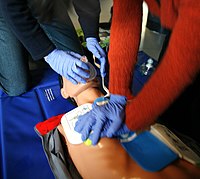
Photo from wikipedia
Objectives Guidelines recommend family presence to be offered during cardiopulmonary resuscitation (CPR). Data on the effects of family presence on the quality of CPR and rescuers’ workload and stress levels… Click to show full abstract
Objectives Guidelines recommend family presence to be offered during cardiopulmonary resuscitation (CPR). Data on the effects of family presence on the quality of CPR and rescuers’ workload and stress levels are sparse and conflicting. This randomised trial investigated the effects of family presence on quality of CPR, and rescuers’ perceived stress. Design Prospective randomised single-blind trial. Setting Voluntary workshops of educational courses. Participants 1085 physicians (565 men) randomised to 325 teams entered the trial. 318 teams completed the trial without protocol violation. Interventions Teams were randomised to a family presence group (n=160) or a control group (n=158) and to three versions of leadership: (a) designated at random, (b) designated by the team or (c) left open. Thereafter, teams were confronted with a simulated cardiac arrest which was video-recorded. Trained actors played a family member according a scripted role. Main outcome measures The primary endpoint was hands-on time. Secondary outcomes included interaction time, rescuers’ perceived task load and adherence to CPR algorithms. Results Teams interacted with the family member during 24 (17–36) % of the time spent for resuscitation. Family presence had no effect on hands-on time (88% (84%–91%) vs 89% (85%–91%); p=0.18). Family presence increased frustration (60 (30–75) vs 45 (30–70); p<0.001) and perceived temporal (75 (55–85) vs 70 (50–80); p=0.001) and mental demands (75 (60–85) vs 70 (55–80); p=0.009), but had no relevant effect on CPR performance markers. Leadership condition had no effects. Conclusions Interacting with a family member occupied about a quarter of the time spent for CPR. While this additional task was associated with an increase in frustration and perceived temporal and mental demands, family presence had no relevant negative effect on the quality of CPR. Trial registration number DRKS00024759.
Journal Title: BMJ Open
Year Published: 2022
Link to full text (if available)
Share on Social Media: Sign Up to like & get
recommendations!